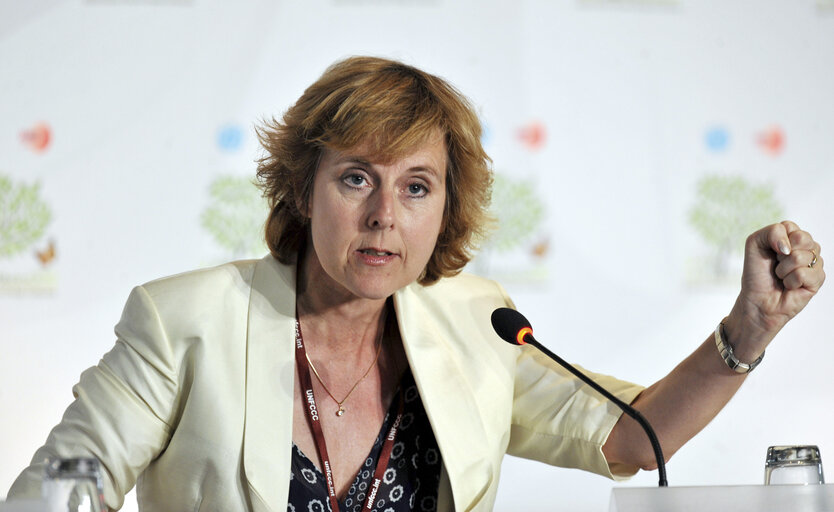"Real Change Is Possible” - Connie Hedegaard on the Future of Climate Action
As former European Commissioner for Climate Action and current Chair of Denmark’s green think tank Concito, Connie Hedegaard, reflects on how climate policy, diplomacy, and local dialogue can work hand in hand to drive real change—if we stay persistent. You’ve worked extensively on countering Trump’s anti-climate policies at both national and international levels. In your view, what are the key ingredients for successful climate diplomacy?
Connie Hedegaard: Persistence! Stay on track! Show the facts, the numbers, the co-benefits and the good cases. Specific examples and calculations are needed as is an updated narrative where climate, green transition, economic welfare and competitiveness AND security must be interwoven.
In Germany, we’re finding it increasingly difficult to engage people who aren’t directly affected by climate change. Is it the same in Denmark? How do you tackle this challenge?
 Also in Denmark there is a tendency that the public debate is focusing on other issues like defense, security and… Trump. Nonetheless even in recent polls climate change comes in third on the voters priority list: Security, health and then comes climate well ahead of e.g. the economy. And there is still a very clear majority which is impatient to see authorities and companies deliver on our ambitious climate targets and it is politically costly to be seen as foot-dragging on implementation. E.g. last summer we had a very big political deal done on the agricultural sector’s climate impact between almost all parties, the sector itself and the Danish Society for Nature Conservation, the so-called Tripartite Agreement. And there is a clear majority among the population who really wants to see this implemented. Nonetheless there are also two parties to the right who try to profile themselves on being against this regulation of the agricultural sector, why tendencies of polarization can be seen. However, parties both right and left of the centrist government work together in opposition to try and push the government into delivering on the climate and energy targets.
Also in Denmark there is a tendency that the public debate is focusing on other issues like defense, security and… Trump. Nonetheless even in recent polls climate change comes in third on the voters priority list: Security, health and then comes climate well ahead of e.g. the economy. And there is still a very clear majority which is impatient to see authorities and companies deliver on our ambitious climate targets and it is politically costly to be seen as foot-dragging on implementation. E.g. last summer we had a very big political deal done on the agricultural sector’s climate impact between almost all parties, the sector itself and the Danish Society for Nature Conservation, the so-called Tripartite Agreement. And there is a clear majority among the population who really wants to see this implemented. Nonetheless there are also two parties to the right who try to profile themselves on being against this regulation of the agricultural sector, why tendencies of polarization can be seen. However, parties both right and left of the centrist government work together in opposition to try and push the government into delivering on the climate and energy targets.
"We need a social transformation" is something we often hear when discussing the acceptance of renewables. Are you familiar with these kinds of debates? What approaches has Denmark developed?
Also in Denmark we have debates around renewables - be it on wind projects or on solar fields, and the hearing procedures can result in difficult and prolonged planning processes. But we have also introduced schemes that e.g. give financial support to local municipalities which install RES capacity, and the project owners have become more skillful when it comes to including the local community in dialogue PRIOR to finalizing project proposals. Right now with the Green Tripartite agreement 21 local/regional entities will have the task to initiate a substantial local dialogue on exactly how to deliver on the agreement in their respective area. And among others the Novo Foundation has pledged to support local dialogues with a substantial amount of money. In other words: There is a huge focus on local inclusion and dialogue - but what comes out of these intentions we still need to see, as the process has just started
As the EU Commissioner for Climate Action, you had the tough job of getting all member states on board with a common climate policy. What was the biggest challenge in that process?
As it was during the financial crisis one of the big challenges was to document to the governments and MEP’s how e.g. energy independency would benefit both Europe’s economy, our security and our job creation (e.g. energy efficiency has the potential to create many jobs that cannot be outsourced). Even member states like Poland who traditionally has been reluctant when it comes to climate policies, understood very well the advantages of being less dependent on imported fossil fuels e.g. from Russia. So the fact that we worked with both a CO2 target, a renewables target and a target for energy efficiency made it possible to compose a package that had elements that all Member States could see an interest in. But of course it was a challenge to get everyone on board high ambition as long as our competitors did not embrace ambitious climate policies. One challenge in EU is that e.g. the big business organizations often do not dare to embrace new initiatives until at least half of their members support it. Thus there is a tendency that we are too slow in changing when change is needed. But in the end the more foresighted European businesses could see their interest in contributing to the long-term transition and to act not just for the short term. The green transition as a driver for innovation and competitiveness was and still is one of the strongest arguments for getting things done.
In recent years—thanks in part to your work—the EU has set ambitious climate goals, aiming for carbon neutrality by 2050. Do you think these targets are realistic? What are the biggest risks to achieving them?
The risk is that we are not getting our act together as fast as we need. However, I do think that now with both the war in Ukraine and the whole security situation and with the Trump administration’s attack on globalism, free trade and our core values EU has gotten a wake-up call that has been heard and many strong forces now realize that a fundamental gear shift is needed in Europe.
In your experience, what drives climate action more—strong government policies or sustainability initiatives from businesses?
We need both elements - and the private and the public sector need to work together. Government policies alone are not enough. Targets and standards are fine - and a price incentive is key - but it is in the companies that words and intentions are transformed into real action and new solutions that people want to be part of. But also the market can not handle the challenge without a clear, reliable and predictable course set by policy makers. The key word is cooperation - including cooperation between silos and sectors
As Chair of the OECD Round Table for Sustainable Development and Concito, Denmark’s green think tank, which emerging technologies or innovations give you the most hope in the fight against climate change?
There are really many: The integration of digital/data/AI and green, smart meters, batteries, Power2X. But there is also a huge potential in very well known technologies like district heating and efficiency. I simply do not understand that we are not harvesting more of the low hanging fruit in efficiency.
You’ve spent decades advocating for climate action. What keeps you motivated? And what advice would you give to young climate activists today?
Well, it is easy to get downbeat over the slow speed with which we are moving forward. But we ARE moving forward: When I became a Minister in 2004 you could not have a debate on climate change without someone who argued that there wasn’t a climate challenge was also invited to the debate. Today we don’t discuss whether there is a problem (with a few exceptions like Mr. Trump!) 10-15 years ago EV’s were seen as a niche - today more than 50 % of the new cars sold in China er electric! See the development in renewables and the downward cost curb making e.g. solar and wind competitive. It took 15-20 years, but now it is a reality. Many more examples could be mentioned, but my point is: Yes, it takes (too) long time to make real change, but seen from the helicopter we are making progress. So my advice to young people: Engage, seek knowledge and don’t give up, but respect that other people can feel insecure faced with the many challenges right now. And have patience - real change is really difficult and takes time. But my own experience is that change is possible.
Thank you


Social Media